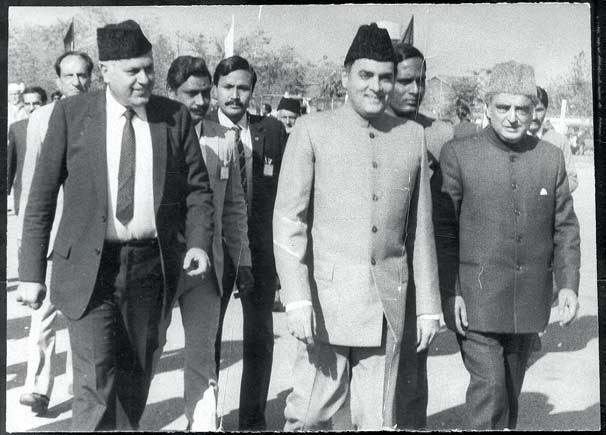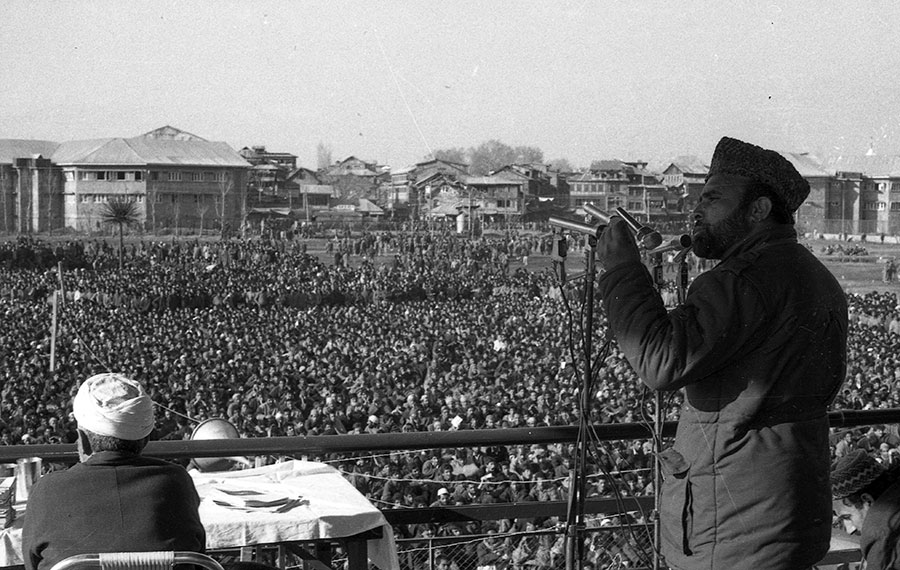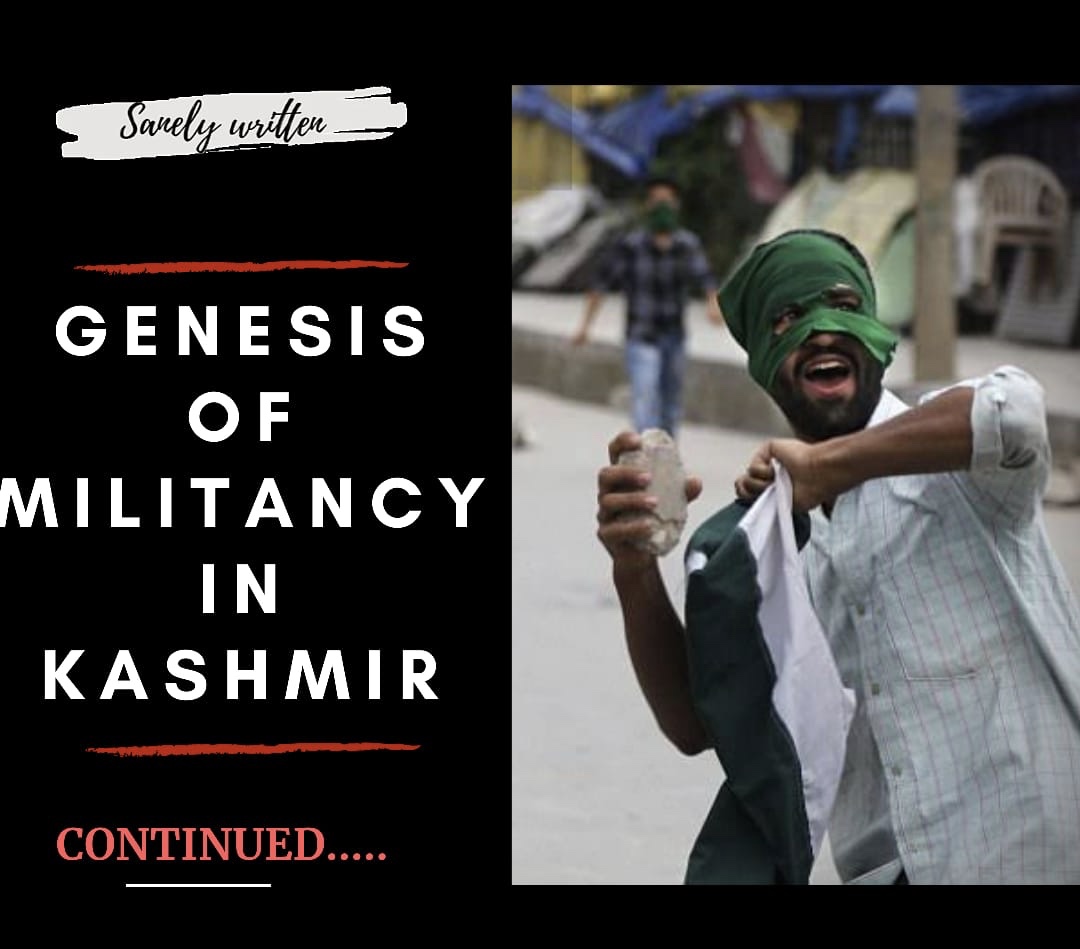‘Gar firdaus bar-rue zamin ast, hami asto, hamin asto, hamin ast’
If there is a paradise on earth, it is here, it is here, it is here.
Moving south, looking back at your burning house with a heart colder than Srinagar’s snow, you asked,
‘Where is that paradise? Where? Where? Where?’
The breathtaking valley of Kashmir had seen the glimpses of terrorism but the major insurgent outbreak took place during late eighties against Kashmiri pandits, their killings, brainwashing people, unfair elections and many more.
Initial Outbreaks of Violence:
The insurgents referred to this violence as ‘justice’ and used Islam to justify their acts. Lots of Kashmiri pandits were killed, 24 Hindu temples were burned down and many such violent acts were carried out in the name of Islam. They were very carefully planned events as most of the insurgent outbreaks took place on ‘Jumma’ ( Friday, also a sacred day in Islam) and the crowd dispersed from the mosques. It was easier to address people on Friday’s because lots of muslims appeared in the mosques to perform their daily namaz. Provocative hate speeches were given in those mosques by some ‘mullahs’ who were trained in brainwashing people and were sent to those places from Pakistan for the exact purpose. Such distorted facts were used to trick people that even a learned and a deep-thinking man would arise too. The people of Kashmir were alien to resisting hordes and foreign rulers. They believed in the principles of non-violence and pacifism and so it was easier for the Islamic fundamentalist influence to take hold of them.
Radical Islam:
It is important here to draw out the differences between Kashmiri Islam and the Fanatical Islam that has taken over the rest of the Islamic world. Kashmiri Islam is a variant of Sufism. The Kashmiri muslims were originally Hindus who were converted from 1300-1800 so there is a lot of Hindu Vedanta influence in them. Much of the teachings of Kashmiri Islam are influenced by their Rishis meaning learned scholars. The rishis had formed their own peaceful Islam which had become secular, democratic, and liberal in their thoughts. Therefore, it was a clash of Islamic thoughts which became one of the reasons for the insurgency.
Radical Islam is one of the major reasons for the increasing insurgency in Kashmir. It is based on the idea of spreading false facts and brainwashing young muslims in the name of Islam and carrying out their vendetta. Many of them were made to believe that they were victims and to become a true muslim they need to follow the Shariat law and Pakistan was there to help them. A militant leader said that they were very young and were manipulated by the militants in Pakistan as they were also very frustrated by the response of the Indian government to their plight. Salman Rushdie, a Kashmiri muslim had published a book called ‘The Satanic verses’ in 1989 but it was banned by Ayatollah Khamenei saying that it was blasphemous and against Islam and prophet muhammad. The Kashmiris were influenced by him and they, without even seeing the book, believed that as Muslims it was their duty to protest. The Jamaat-i-Islami party spread a rumour that Ayatollah was related to the Kashmiri muslims as his ancestors had come to Kashmir. They believed this rumour and it became a matter of pride for them without even realising that he was a Shia muslim and most of the Kashmiri muslims were sunni. The Jamatis claimed that the Kashmiri pandits were Indian agents and they were collecting weapons against them. As a result, the Kashmiri muslims started buying weapons instead of TV’s and the Kashmiri women started selling their ornaments to raise money for the purchase of weapons.
Afghan war:
The rise of indigenous Afghans against the soviet superpower and the advent of television sets on a mass scale in Kashmir in the late 80s allowed the Kashmiris to watch this rise which lifted their spirits as well. The impact of this coverage was so much that the government issued an order not to telecast the scenes in Kashmir. The Afghan war also resulted in a surge of armaments and manpower. Weapons in large numbers were brought in Kashmir and were made available to the people. There were times when the Police found themselves outnumbered against the insurgents who had grenades and rocket launchers at their reckoning.
Many elite people preached for all Kashmiris to send their sons in insurgency and it was considered a matter of pride for them. But the fact was that the elite refused to send their own sons while encouraging others to do so. The people were devoid of education and had no ways to earn, therefore insurgency was considered a way the commoners could prove their valour and gain some respect.
About one-third of the former princely states were under Pakistani occupation so it was quite natural to have a Pakistani influence on the younger generation in the ways of Islamic fundamentalism. The 80s saw a huge surge of political activities in Kashmir and a more politically conscious youth. The Jamaat-i-Islami, a Radial Islamist party took part in the elections and won some of the seats. Its sole objective was to spread strict Islamic Shariat law in Kashmir. They were able to influence people in the rural areas. In the 70s, Jamaat used to offer education to the people which was filled with hatred, criticism, and non-muslims and anti-India messages. Their financial help came from its members who had to pay 10% of their earnings to the party. The Jamaati madrassas had to face a ban in 1975 by Farooq Abdullah who said that they used to spread communal poison but the results were not what he had imagined. They were simply employed in the government schools where they kept on spreading their messages and propaganda until more madrassas were setup. Many reports were received by the Government of India stating many Kashmiris returning back to Kashmir from the border areas. By the year 1984, a theme ‘Islam is in Danger’ was propagated amongst the youth which resulted in a large number of Kashmiris going across the borders where they were trained in militant activities and were fueled with hatred towards India and its armed forces. By 1989, the Government estimated about 10,000 Kashmiri people returning back from border areas having received military training.
Filled with Islamic fundamentalism, the ‘jihadis’ had made ‘peace’ with the idea that the only way to come out of these atrocities and to ‘save Islam’ from the ‘Kafirs’ was to take up weapons in their own hands. It was not all about the financial help that they received from across the borders. Some jihadis speak of the sheer power they used to feel whenever they held a gun in their hands. They felt an emotional inrush that the future of their homeland was in that particular weapon and now, as they hold it, in their own grasp. There were social pleasures as well that came with it. It was considered a status symbol to have a jihadi or a Mujahid in their family.
MUF and the 1987 elections:
The MUF or the Muslim United Front was formed in September 1986 in Srinagar on the first day of Muharram. It was formed to keep a check on the National conference- Congress alliance (Farooq Abdullah, having lost the support of the masses after the 1984 elections turned towards congress for help) in the state which they had believed was done to hinder the rights of the Muslim community. The aim of the front was the promotion of islamic solidarity, maintaining its cultural heritage, and to promote co-operation among the muslims. Their influence in the valley was so much that people started believing that the victory of the Front was the victory of Islam. The Jamaat-i-Islami was one of many such organisations that supported the front. The crescent moon and the star sign on a green flag filled people with joy. The faith of the people was so much that they often used to dance around on the streets waving the flag. They promised employment to the people and said they would bring an end to the corruption in the state. There was a MUF ‘wave’ that was flowing all around the valleys of Kashmir.

The elections were held on 23rd March 1987. The MUF secured 4 seats and secured around 30 percent of the total votes polled. The elections were believed to be rigged by the National conference- congress alliance. The polling agents were beaten inside the polling booths and not only by the police but also by the National conference candidates. Strong armed tactics were used, ballot boxes were pre-stamped to NC, people were simply not allowed to vote, and the counting was stopped as soon as they saw the opposition leader getting ahead. The MUF received a lot of public affection and sympathy. They believed that Rajiv Gandhi and Farooq Abdullah took away their right to vote. They began thinking that if they had an Islamic country, they would not have received such discrimination. Almost all the candidates of the MUF were taken into custody as soon as the alliance came into power. Some of them were even beaten inside the polling booths both by the police and the alliance supporters. Many of them were sent to jail under the Public Safety Act and were subjected to all kinds of torture. It was during that time when five young men, having faced their fair share of discrimination and hate before, formed the Jammu Kashmir Liberation Front (JKLF) in the valley in 1989-90. They took a collective decision to go to Pakistan to take military training and weapons. Ashfaq Majeed Wani who was a brilliant scholar and a great athlete was denied admission in the medical college as he was not able to give a Maruti car as a bribe. He was detained on March 23rd, 1987, and was charged with a crime allegedly committed on April 4th. He was then imprisoned and was released after 9 months of custody with cigarette burns all over his body. All the other four of the founding members of the JKLF have similar stories of discrimination and torture that they faced which subsequently turned them into militants.

As a result of the fasad in the name of elections that took place in 1987, the Kashmiri boycotted the 1989 Lok Sabha elections as well. Pamphlets were distributed through which the militants spread the message that no one should leave their house as they want to show to the world that Kashmir has lost its faith in the Indian parliamentary system. The National Conference won all the seats from the valley as no other opposition party candidate dared to field.
The people in Kashmir had started lifting weapons prior to the elections. Their cause then was religiously fuelled. But it cannot be denied that the National Conference and the ruling Congress party in many ways encouraged the propaganda to meet their own political ends. Pakistan had also a lot to do with the happenings of Kashmir. Not able to take it by force, they started spreading hatred in people against Hindus and India in the form of radical Islamic preachings and turning the youth into militants by brainwashing them. Having faced defeats from the hands of the Indian army, they realised it was impossible to face the army head-on so they used our innocent Kashmiri against their own people just for their vendetta and the National congress party turned a blind eye towards all this just to fulfill their needs and their political benefits.
References:
• A study of what led to Insurgency in Kashmir Valley & proposed future solutions by Priyanka Bakay and Sumit Bhatti
• Jammu and Kashmir in the Indian union: the politics of Antonomy by Dasgupta, Chandrashaker
• Genesis and Growth of Militancy in Kashmir
• Patterns of impunity in Jammu and Kashmir




3 replies on “Genesis of Militancy in Kashmir (Continued)”
Beautifully written
Amazing content…
Such a profound and unbiased content in just 8 minutes ????…extraordinary work??